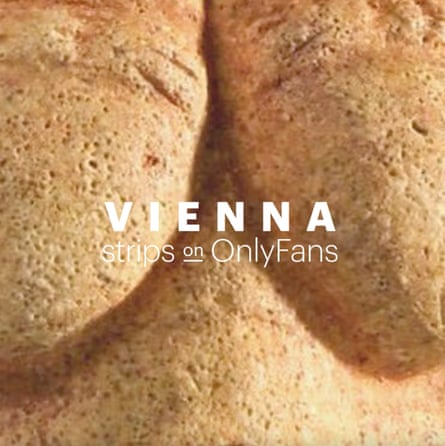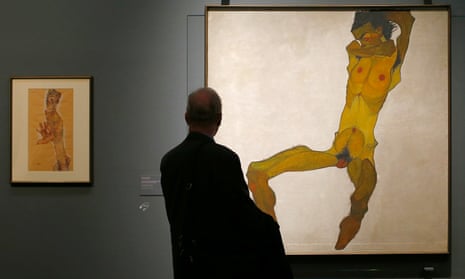More than a century after the artists of the Vienna Secession declared “to every age its art; to art its freedom”, the Austrian capital has found a new site for artistic expression free from censorship: the adults-only platform OnlyFans.
Vienna’s tourism board has started an account on OnlyFans – the only social network that permits depictions of nudity – in protest against platforms’ ongoing censorship of its art museums and galleries.
In July, the Albertina Museum’s new TikTok account was suspended and then blocked for showing works by the Japanese photographer Nobuyoshi Araki that showed an obscured female breast, forcing the museum to start a new account. This followed a similar incident in 2019, when Instagram ruled that a painting by Peter Paul Rubens violated the platform’s community standards which prohibit any depictions of nudity – even those that are “artistic or creative in nature”.
In 2018, the Natural History Museum’s photograph of the 25,000-year-old Venus of Willendorf figurine was deemed pornographic by Facebook and removed from the platform.

The Leopold Museum has likewise struggled to promote its collection of nudes by the expressionist Egon Schiele, with advertising regulators in Germany, the UK and US refusing to show them in a city tourism campaign in 2018. (The tourist board successfully resubmitted the posters with banners obscuring the bare bodies reading: “Sorry – 100 years old but still too daring today.”)
A short video featuring the painting Liebespaar by Koloman Moser, made to mark the Leopold Museum’s 20th anniversary this year, was rejected by Facebook and Instagram as “potentially pornographic”.
These works and more are now on full display, safe from the threat of censorship, on Vienna’s OnlyFans profile – and only teased from Facebook, Instagram and Twitter.
Helena Hartlauer, a Vienna tourist board spokesperson, said the city and its cultural institutions had been finding it “almost impossible” to use nude artworks in promotional materials. Some works in the Albertina’s current exhibition, by the Italian portrait artist Amedeo Modigliani, are too explicit to promote it, she said.
“Of course you can work without that, but these artworks are crucial and important to Vienna – when you think of the self-portrait by Schiele from 1910, it’s one of the most iconic artworks. If they cannot be used on a communications tool as strong as social media, it’s unfair and frustrating. That’s why we thought [of OnlyFans]: finally, a way to show these things.”
The first subscribers to “Vienna’s 18+ content” on OnlyFans will receive either a Vienna City Card or an admission ticket to see one of the artworks in person.
The city is renewing efforts to promote Vienna as a travel destination since the Austrian government relaxed border restrictions for foreign nationals. Arrivals were down 78.4% in 2020 compared with 2019, with some months recording next to no visitors at all.
But Hartlauer said the new “Vienna strips on OnlyFans” campaign was not just to encourage tourists; it was also to raise awareness of the censorious standards within which contemporary artists are working.
Instagram, along with its parent company, Facebook, has retained its strict no-nudity policy in the face of years of criticism, and even as it has become a more essential platform for artists. In July, creatives protested against social media networks’ uneven promotion of their work with the hashtag #FixTheAlgorithm.
“Compared to the artists who fall under this censorship, the tourist board in Vienna and even the art collections have it easier,” said Hartlauer. “We just want to question: do we need these limitations? Who decides what to censor? Instagram censors images and sometimes you don’t even know about it – it’s very untransparent.”
OnlyFans was founded in 2016 to be a more permissive and fair platform for online creators of all kinds, though it became synonymous with sex work through the pandemic. Last year the site exploded from 7.5 million to 85 million users, paying out more than $2bn (£1.45bn) in subscription fees to 1 million creators.
In August, OnlyFans announced that it would ban “sexually explicit” content, claiming it was because of pushback from the banking sector. The company quickly reversed course after outcry – but for many creatives, it served as a reminder of their dependence on online platforms.
Ironically, the Vienna tourist board, having decided to launch a presence on OnlyFans, encountered barriers promoting it. Twitter, Facebook and Instagram all rejected links to the platform, requiring the board to liaise with their service teams, in some cases over weeks.
Hartlauer said the hurdles to launching the campaign proved its point about the insidious power of social media platforms to influence and suppress artistic expression. “It shows us again that this is the right question to be asking.”
She said the tourist board would retain Vienna’s OnlyFans account beyond this campaign, though she did not know how, or how often, it would be updated.
“This marketing initiative of ours is not the ultimate solution for this problematic relationship between the art world and social media, but … we want to stand up for our values and our beliefs,” she said. “Vienna has always been famous for being open-minded.”
